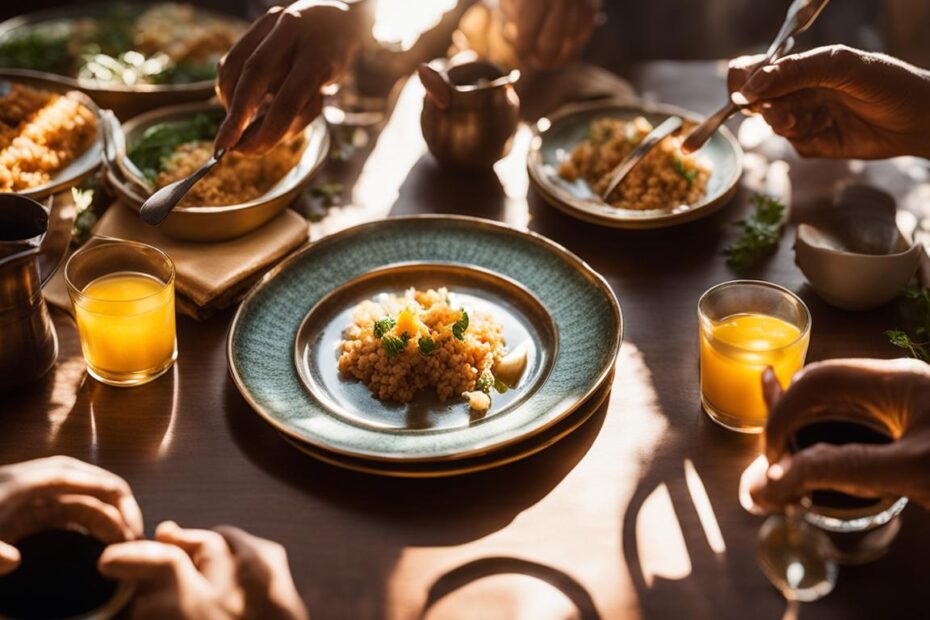Eating lunch is an important daily ritual that nourishes our bodies and spirits. Pausing before a meal to give thanks is a tradition in many cultures and faiths. Prayers at lunchtime remind us of the deeper meaning behind this simple act. They connect us with our families, our communities, the earth, and the divine. This essay explores the origins, purpose, and power of midday blessings.
A History of Saying Grace
- Ancient roots. Nearly every early civilization incorporated meal rituals, from harvest festivals to sacrifices asking the gods for bounty. These customs laid the foundation for modern-day graces.
- Shared Mediterranean heritage. Judaism, Christianity, and Islam shaped prayer customs across North Africa, the Middle East, and Europe. Believers blessed bread, wine, and olive oil.
- Persecution and privacy. When groups like Puritans and Pilgrims faced oppression for their faith, they continued their traditions quietly at home. Families held hands whispering prayers away from hostile eyes.

Why Pray Before Meals?
Praying at lunchtime serves many functions beyond the food itself. It:
- Reminds us that eating keeps us alive. By thanking “the hands that prepared this meal,” we appreciate those who grow ingredients, transport and sell food, and cook.
- Fosters gratefulness. Even a humble meal deserves gratitude. We acknowledge the labor and sacrifice of plants, animals, and people that allow us to eat.
- Links generations through ritual. As we teach little ones to say grace, we pass down time-honored wisdom. We feel connected to ancestors who once spoke the same words.
- Provides a rare pause from busyness. Rushing from task to task, we benefit from sitting still for one minute. A deep breath grounds us for the afternoon ahead.
Bringing People Together
Communal eating connects groups through caring customs. Consider:
- Hospitality cements social bonds. Sharing sustenance makes guests feel warmed and welcomed. Hosting others for lunch enables fellowship.
- Potlucks pool community resources. By each contributing our best dish to a meal, we help feed everyone. Combining food symbolizes unity.
- Family dinners build relationships. Regularly eating supper together, even briefly, helps parents and kids communicate. Laughter over favorite foods eases tensions.
Sample Prayers from Different Faiths
While grace can be as simple as “thank you,” many creeds offer poetic midday blessings.
Christian Prayer
Bless us O Lord, and these thy gifts, which we are about to receive, from thy bounty, through Christ our Lord. Amen.
Islamic Prayer
All praise and thanks are for Allah, who has guided us and brought us together to share this meal. Allah, bless this food You have provided, make it nourishing and satisfying, and bless those whose labor and care brought it to our table. Amen.
Jewish Prayer
Blessed are You, Eternal One our God, who brings bread from the earth and the fruit of the vine. Amen.
Buddhist Prayer
We vow, with all beings, to fully actualize every wholesome cause that we have created together with all Buddhas and great Bodhisattvas. We vow that whatever we eat or drink will be medicine to sustain our practice. We vow to eradicate all impurities that oppose enlightenment especially our greed, anger and ignorance. We vow to practice wholeheartedly without distraction until all living creatures are equally freed.
Secular Prayer
We take a moment to acknowledge all the people whose work brought this meal to our table, from farmers to grocers to the hands that prepared the food. May we be nourished so that we can strengthen our bodies, hearts, and minds to make the world a little better today.
Final Thoughts: Mindfulness as an Act of Communion
Beyond particular words or customs, praying before eating ultimately connects us to the shared human experiences of hunger and relief, labor and rest, survival and celebration. This unity spans across all cultures and creeds.
Grace grounds us in the cycles of sowing and harvesting that make civilization possible. Saying thanks links us spiritually to millions of people eating the exact same foods worldwide today. Viewed this way, a simple lunch anchors us to the turning of the seasons, the diversity of global agriculture, and our common dependence on plants, animals, soil and water.
Working adults often feel pressed for time. Yet even 30 seconds of prayer rewards us with stronger focus and renewed energy. Kids enjoy participating in serious rituals that signify their growing maturity. Saying grace over meals, however modest, weaves an invisible web of care through our homes, schools, workplaces and places of worship.
So as you gather for lunch today, take a quiet moment to bless the meal. Feel gravity’s pull deep within your body, connecting to cycles older than humanity. Join hands if eating with others, conscious of ages-old wisdom written into your gesture. Send thoughts of kindness to all who labored so that you might be fed. Taste slowly and deliberately, attuned to all the miracles of sun and rain embedded there.
Let this simple observance nourish your body and soul. And may it provide the strength to nourish the lives of others in turn.





